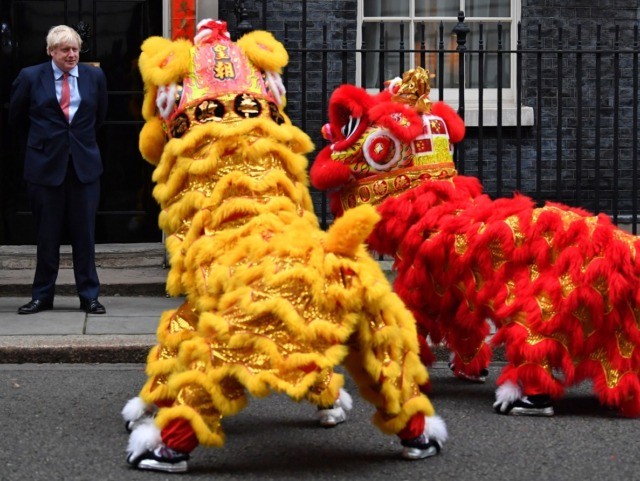The United Kingdom has shrugged off concerns of handing China a back-door key to the nation’s critical national infrastructure and spiking post-Brexit trade with key Anglosphere allies, signing off the involvement of Huawei in the future 5G data networks.
Tech giant Huawei, a company critics claim is controlled by the Chinese government and uses its advanced, cheap, and pervasive equipment to commit espionage on foreign powers — claims the company strongly denies — will have a so-called limited role in the rollout of next-generation 5G technology, the British government has decided.
The move was decided Tuesday by the UK National Security Council, a group of senior cabinet ministers chaired by the Prime Minister and attended by civil servants and military bosses, following advice from the Civil Service, which decided in spite of the many warnings and potential pitfalls presented by the Huawei deal to rubber-stamp the deal last week.
Under the decision, Huawei will not be permitted to supply equipment to “sensitive parts” of the network core, but will provide a third of the equipment to what the BBC reports to be the “periphery” of Britain’s future 5G network. The report states the permitted equipment will include masts, clearly implying the radio backbone of the network itself which will handle consumer and business data will use Huawei technology.
The distinction between the core and the periphery has been enough for the government to overlook security warnings from both senior intelligence figures as home, and key allies abroad. But the United States, for instance, which has been absolutely clear in its calls for Huawei to be totally excluded, believes the distinction now will not protect the network from potential espionage and sabotage in future.
What is less clear, is why the British government has so willingly entered into a relationship with Huawei which appears to sabotage the government’s own aims on Brexit — namely signing trade deals with close allies after leaving the European Union. Australia and New Zealand have warned the UK against imperilling the Five-Eyes intelligence sharing agreement — the deepest and most successful of its kind in human history — by admitting Huawei into the nation’s data architecture, and the United States has explicitly said Huawei involvement would imperil a post-Brexit trade deal.
This is of particular importance because signing a trade deal with the United States quickly after Brexit appears to be a key lynchpin of the post-EU strategy, as an easy passage of that agreement would be a major signal to the rest of the world that the UK is emerging ready to trade, and easy to do business with. It also holds the European Union’s feet to the fire, as their anticipated prevarication over signing a deal with the UK would be shown up as a sham in the light of a quick deal with the U.S.
Yet, the BBC reports, China seems to have given the United Kingdom a simple choice — choose Huawei or face “substantial” repercussions to trade and investment. Given the choice between the U.S. and China, Prime Minister Johnson appears to have chosen Beijing.
Given this disconnect in stated policy and public action, some may view the advice of unelected civil servants to the National Security Council to ignore security and trade concerns and sign with Huawei anyway with concern.
Responding Tuesday, a White House spokesman said the Trump administration was “disappointed” with the decision, while Conservative statesman and former party leader Sir Iain Duncan Smith has said the decision “beggars belief”.
Klon Kitchen of the Heritage Foundation said of China’s previous bad-faith behaviour on leveraging their tech equipment installed in foreign nations: “China has already shown it’s perfectly willing and able to exploit others in this way, having siphoned data from the African Union headquarters in Ethiopia, over networks its state-owned companies constructed earlier this decade. Recent history and common sense are united: it would be utterly foolish for Britain to give China similar access.”
James Delingpole writes of this in Breitbart London:
The Huawei deal is starting to look like an unforced error so epically naive, dangerous and wrongheaded that it threatens to eclipse anything Boris Johnson may achieve in the rest of his administration.
It’s also a betrayal of the very thing on which Boris had hoped to stake his legacy: delivering a successful, meaningful Brexit.
One of the key elements in Boris’s vision of a bright, post-Brexit future for Britain outside the European Union is international trade: all those incredible deals Britain is going to negotiate once it is no longer shackled by EU regulations – starting, of course, with the ‘very big deal’ promised by President Trump with the U.S.
But Trump has since made it clear that one of the main obstacles to such a deal is if Britain ignores its allies’ security concerns and goes ahead with the Huawei deal.
If you wanted to be cynical, you could argue that the Remain-biased Civil Service — led by arch-Remainer Mark Sedwill — is using the Huawei deal as a cunning way to sabotage Boris’s post-Brexit deals in order to make the Brexit vote look like a mistake and to make a return to membership of the EU more likely. You would also, quite likely, be absolutely right in your assessment.
We have scotched the Remainer snake but we have not killed it. No doubt it will come back to bite us many times hence.

COMMENTS
Please let us know if you're having issues with commenting.